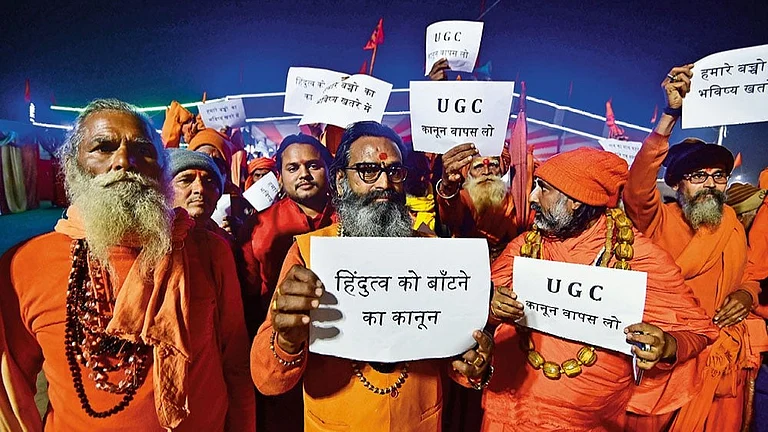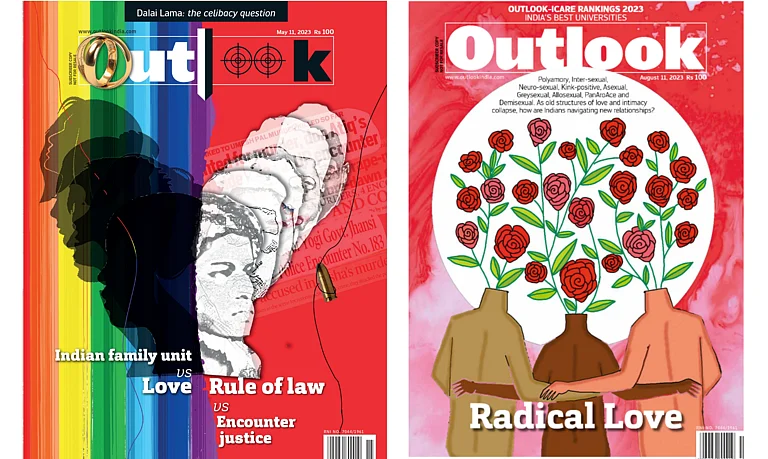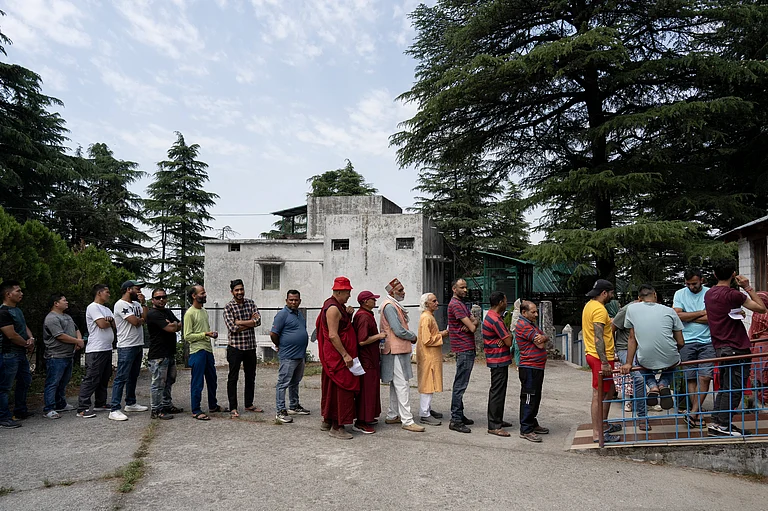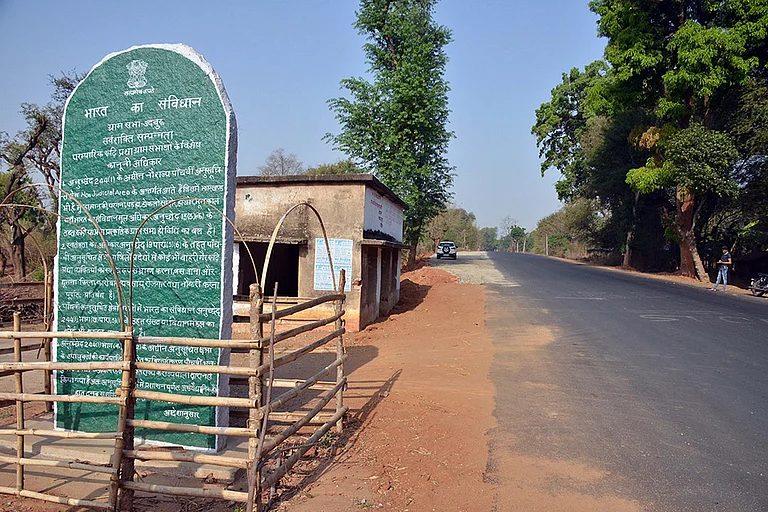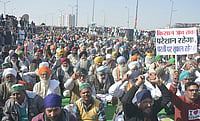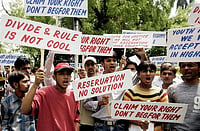After hearing the clutch of petitions seeking legal recognition of same-sex marriages, the Supreme Court last week reserved its judgement.
Earlier this year, the Supreme Court transferred to itself all pleas over the legalisation of same-sex marriages that had been filed in various high courts. Then the Apex Court formed a five-judge Constitution bench to hear the case. The hearing began last month.
While the petitions were filed under various personal laws, the SC bench headed by Chief Justice DY Chandrachud took up those only under Special Marriage Act, 1954 (SMA) for its consideration.
While the petitioners brought forth multiple lines of arguments, the Centre and other respondents such as Jamiat-Ulama-i-Hind opposed the pleas.
Here we explain why the court took up only SMA-based petitions, what the petitioners and respondents argued, and what the court said.
Why did SC take up only SMA pleas?
Personal affairs such as marriage, divorce, and succession in India are governed by personal laws that are specific to religions.
The broadest personal law is the Hindu Marriage Act, 1954 (HMA) which applies to Hindus, Buddhists, Sikhs, Jains, and all the sects of Hinduism. There also exist Indian Christian Marriage Act, 1872, and uncodified Muslim personal law.
There is also a secular Special Marriage Act, 1954 (SMA). Initially, the law was made to address inter-faith marriages.
The petitioners had sought legal recognition of same-sex marriages under HMA, Foreign Marriage Act, 1969, and SMA.
The Supreme Court only took up the petitions under SMA and rejected all other pleas.
The SC decided to consider only SMA-based pleas after difficulties and ramifications for the HMA and personal laws of various religious groups were pointed out if the Supreme Court were to hold same-sex marriages valid.
"Then we can keep the personal laws out of the equation and all of you (lawyers) can address us on the Special Marriage Act," said the SC.
What was argued in 10 days of hearing?
The CJI Chandrachud-led five-judge Constitution bench heard the case for 10 days.
Petitioners as well as the respondents were heard. The Union government has rejected the idea of same-sex marriages consistently. Even before the hearings began, the Centre had said such recognition would create "havoc" in society and had called it an "urban elite" issue. Union ministers have also stated that the government does not accept same-sex marriages and have said that the Parliament should take the call on the issue, not the Supreme Court.
Here we list day-by-day developments in the case:
Day 1
Senior Advocate Mukul Rohatgi argued that same-sex couples have a fundamental right to marry.
Sr. Adv. Abhishek Manu Singhvi said that such a recognition could not be limited to same-sex couples but should be expanded to the broader queer community.
Both Rohatgi and Singhvi said the Supreme Court should be hearing pleas only related to the Special Marriage Act, 1954. The SC accepted this.
"He shared Mr. Rohatgi’s view to restrict the scope of the case to just the Special Marriage Act and not involve any other personal laws. After deliberation, the Bench proposed that for now, the matter be limited to the Special Marriage Act and not involve any other personal laws," reported SC Observer.
Sr. Adv. Menaka Guruswamy said that mere recognition of same-sex marriages would not do but their everyday activities should also be addressed.
"A mere recognition of the fundamental right [under Articles 14, 19, and 21 of the Constitution] to marry will not address the second, more practical, aspect of life. Queer persons will need laws allowing them to avail insurance, buy or rent homes, open bank accounts and so on," reported SC Observer.
Solicitor General Tushar Mehta said that the case was beyond the scope of the Supreme Court and fell within the domain of the Parliamant.
Mehta also said that the intent at the time of making SMA was to address the marriage between a biological man and woman. To this point, Chandrachud said that there is nothing as an absolute man or woman, a comment which ignited debates over gender and sex outside the court.
Jamiat-Ulema-e-Hind, represented by Sr. Adv. Kapil Sibal, also opposed the pleas seeking legalisation of same-sex marriages.
Day 2
Sr. Adv. Rohatgi relied on the gender-neutral phrasing of the Special Marriage Act, 1954, to press for legalisation of same-sex marriages.
Rohatgi pointed out that SMA spoke of marriage between "any two persons". He also said that social acceptance would follow the legal sanction by the court.
Sr. Adv. Singhvi said that the laws cannot discriminate on the basis of their innate characteristics.
"Drawing the Bench’s attention back to Navtej, Dr. Singhvi stated that an individual cannot be discriminated against based on ascriptive characteristics. Sexual orientation and identity are innate to the individual," reported SC Observer.
To this, Chandrachud said, "So you’re saying the State cannot discriminate against an individual based on a characteristic over which a person has no control." Singhvi agreed.
Day 3
The third day of hearings concerned discussions over minimum age of marriage, notice period under SMA, and procreation.
Sr. Adv. Singhvi opposed the 30-day notice period clause under SMA, saying that it would violate personal privacy.
"Nearing the end of his arguments, Singvi highlighted that the notice period under the SMA violates an individual’s privacy along with their personal and decisional autonomy," reported The Indian Express.
Singhvi also said that current minimum age requirements would apply to same-sex marriages as per their professed gender.
The issue of rape was also brought up. Currently, the Indian Penal Code (IPC) has a gendered definition of rape where only a woman can be the victim.
"Dr. Singhvi pointed out that the criminal offence of rape has been defined as non-consensual penile vaginal penetration. This definition may not apply to queer couples. However, he pointed out that if the definition was changed to being just non-consensual and penetrative, then the law on rape could apply to queer persons as well," reported SC Observer.
Sr. Adv. K.V. Vishwanathan said the arguement that same-sex marriages could not be legalised as same-sex persons could not produce children is not valid.
Vishwanathan argued that procreation can be a part of marriage, but not an integral part of it.
"None of the statutes governing marriage prescribe an upper age limit for marriage. People who are beyond the age of reproductive capacity are allowed marry. People who cannot or don’t want to have children as well. Procreation is an incidental part of marriage and helps in developing a human personality," SC Observer reported Vishwanathan as saying.
Day 4
The fourth day of hearings mainly addressed the issue of marriages under Foreign Marriage Act and fundamental rights.
Sr. Adv. Geeta Luthra addressed the issue of marriages under FMA. She was appearing for petitioners who had got got married abroad.
"Seeking recognition for their marriage in India under the Foreign Marriage Act, 1969, she contended that only a marriage against international law would be denied recognition under the FMA. Arguing that it wasn’t the case here as the couple’s marriage was legally recognised in the US, she sought similar recognition in India," reported The Express.
Sr. Adv. Sourabh Kirpal argued that homosexual persons are inherently entitled to fundamental rights.
"Mr. Kirpal clarified that the queer community wasn’t seeking equal rights because they are granted to heterosexual persons. Instead, they were demanding the fundamental rights that they are inherently entitled to," reported SC Observer.
Day 5
The fifth day of hearing addressed queer marriages in India and the broader effect of recognising same-sex marriages.
Karuna Nundy argued that Transgender Persons Protection Act, 2019 already cover queer identities in India.
"Asserting that queer persons’ right to marry has already been recognised by the Transgender Persons Protection Act, 2019, flowing from the 2014 NALSA judgement, advocate Karuna Nundy argued that all queer identities are part of this term," reported The Express.
Nundy also used the wording in the National Legal Services Authority v. Union of India (2014) judgement to seek recognition under SMA.
"Ms. Nundy claimed that the NALSA judgement used the phrase ‘Third Gender Spouse’. This included “non-binary’ persons also. Therefore, she sought for this phrase to be read along with the words ‘husband’ and ‘wife’ in the SMA," reported SC Observer.
SG Tushar Mehta aruged that around 160 laws would be affected if same-sex marriages would be legalised and around 72 gener identities would need to be included if the broader LGBTQI+ community is included in the court's judgement. Therefore, he argued, it should be the Parliament that should decide the issue and not the Apex Court.
"Mr. Mehta began by arguing that in this case, it was Parliament that had to make the law, and not the SC. He stated that the pleas seeking marriage equality impacted at least 160 other laws. Further, in ‘LGBTQIA+’, the ‘+’ included at least 72 different identities on the gender spectrum. Therefore, this class of persons was undefined and unidentifiable by law. In order to make laws that impact so many statutes and classes of persons, the SC is not the appropriate forum," reported SC Observer.
Mehta further said that SMA's intent and character cannot be altered by including same-sex marriages within its scope, according to The Express.
The Express reported, "Adding that the lawmakers had a conscious intent to include only heterosexual marriages under the SMA, Mehta said that the Act’s character and intent cannot be altered."
Day 6
The sixth day concerned the Centre's opposition to pleas seeking legalisation of same-sex marriages.
SG Mehta said that seeking such recognition under SMA amounts to seeking recognition of prohibited relationships. He said someone might tomorrow seek recognition of incestuous relationship.
Mehta also said that there is no fundamental right of seeking recognition of one's relationship.
The SC Observer reported, "Mr. Mehta went on to state that the rights to love, cohabit, project sexual orientation and choose a partner were all fundamental rights. However, these rights did not mean that there is a fundamental right to seek legal recognition of relationships such as marriage. An LGBTQIA+ couple could have a ceremony if they wished but they cannot compel the State to legally recognise this marriage."
Day 7
The Centre informed the Supreme Court that it was open to the formation of a committee that could address concerns of same-sex persons short of marriage.
Some welcomed the Centre's suggestion but said it was not what they were seeking. They were seeking the right to marry.
The Centre went on to say that there is no fundamental right to marry.
The Centre also said that altering Special Marriage Act, 1954, would violate the separation of powers between the Judiciary and Legislature.
Sr. Adv. Rakesh Dwivedi, appearing for BJP-ruled Madhya Pradesh, said the Supreme Court could not force a societal change.
Dwivedi further said that legalising same-sex marriages would harm the dignity of heterosexual marriages.
"Mr. Dwivedi also suggested that changing the provisions of the SMA to uphold the dignity of LGBTQIA+ couples is detrimental to the dignity of heterosexual couples. CJI Chandrachud was quick to enquire how this is the case. Mr. Dwivedi stated that marriages were meant for heterosexual men and women and had historical significance. Altering this meaning would diminish that significance," reported SC Observer.
Day 8
Sr. Adv. Rakesh Dwivedi continued his arguments against legalising same-sex marriages.
Dwivedi was joined in opposition to same-sex marriages by Islamic organisation Jamiat-Ulama-i-Hind, represented by Sr. Adv. Kapil Sibal.
Sibal said legalising same-sex marriages would be a "very dangerous proposition".
The Jamiat-Ulama-i-Hind argued that it was a "very dangerous proposition" to seek a declaration validating same-sex marriages from the court as Parliament isn’t likely to do much, reported The Express.
Sibal went on to say that the Parliament would need to make a law for same-sex persons and the Apex Court could not issue a declaration in the matter on the basis of fundamental rights argument.
"Mr. Sibal went on to argue that heterosexual and non-heterosexual couples were separate classes of people. Different instances flow from heterosexual and non-heterosexual marriages. To treat two unequal classes of people equally would defeat the purpose of Article 14. If non-heterosexual marriages must be legally recognised, then Parliament must do so in the same manner it made law for transgender persons," reported SC Observer.
Day 9
The state continued its opposition to same-sex marriages on ninth day of the hearings.
Appearing for National Commission for Protection of Child Rights (NCPCR), Additional Solicitor General (ASG) Aishwarya Bhati said that while the concept of gender may be "fluid", the concepts of mother and motherhood are not.
Bhati argued that child welfare would not be served in the absence of heterosexual parents.
"Entire architecture of our laws is to protect the interest and the welfare of children who are naturally born to heterosexual persons, and the State is justified in treating heterosexuals and homosexuals differently," The Express reported Bhati as saying.
Day 10
The hearings concluded on the 10th day and the Supreme Court reserved its judgement.
The petitioners seeking recognition of same-sex marriages argued that the state had a duty to enable it and that it did not go against the "grain" of Special Marriage Act, 1954.
Moreover, Sr. Adv. Singhvi argued that civl unions short of marriage could not be a solution.
"Senior Advocate AM Singhvi told the Bench that a civil union, as permitted in some countries, is not a solution to what same-sex couples are asking for. Singhvi said that civil unions are not an equal alternative and do not address constitutional anomalies presented by excluding non-heterosexual couples from the institution of marriage," The Express reported Singhvi as saying.
The Delhi Commission for the Protection of Child Rights (DCPCR) also intervened and stated that there was no evidence to say that same-sex marriages had any adverse effect on adopted children.
"She presented a statement from the Indian Psychiatric Society, which said LGBTQIA+ couples should enjoy the same rights to marriage and adoption as all other citizens. There is no evidence to suggest that their participation would have negative effects...These studies [by APA] canvassed the psychological impact on children in 50 countries where same-sex couples are allowed to adopt. They find that there is no adverse impact and often, the children academically outperform those who have straight parents," SC Observer reproted Sr. Adv. Maneka Guruswamy as saying, appearing for DCPCR.







